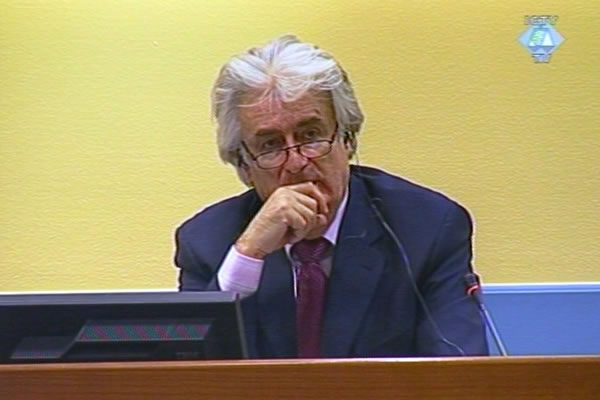Home
KARADZIC ASKS JUDGES TO ACQUIT HIM
Radovan Karadzic wants to be acquitted on all counts in his indictment as, in his view, in the past two years the prosecution has failed to prove ‘my fingerprints’ were on the crimes committed in the war in BH
 Radovan Karadzic in the courtroom
Radovan Karadzic in the courtroom Radovan Karadzic has asked the judges to acquit him on all 11 counts in the indictment charging him with his role in the four joint criminal enterprises: forcible and permanent elimination of non-Serbs from large parts of BH which reached the scale of genocide in some municipalities, the terror campaign in Sarajevo, taking UN staff hostage and the Srebrenica genocide. He made the request at a hearing held under Rule 98 bis of the Rules of Procedure, which allows the accused to ask for an acquittal after the prosecution rests its case on those counts in the indictment that the prosecution has failed to prove to a degree that may support a conviction.
Presenting the argument on the first count in the indictment, Karadzic’s legal advisor Peter Robinson said that in seven BH municipalities in 1992 ‘there was no genocide’. The defense invoked the judgment of the International Court of Justice in the case brought against Serbia by Bosnia and Herzegovina, and the Tribunal’s judgments in the cases against Goran Jelisic, Dusko Sikirica, Milomir Stakic, Radoslav Brdjanin and Momcilo Krajisnik. All of them were found not guilty of genocide. The defense contends that the prosecution has failed to present ‘any new evidence’ and therefore, despite the ‘immense sufferings of the people’ Karadzic should be acquitted of genocide.
In Karadzic’s view, the prosecution has failed to call enough evidence of the intent to remove Muslims and Croats permanently from the areas Serbs considered as their own; this was the foundation of the indictment against him. The Serb side in fact merely complied with its obligation under the Yugoslav law on all people’s defense and social self-protection to remove the civilians from the combat zone, Karadzic argued. In fact, what the Serbs did was similar to the US authorities evacuating the population to a safe area ‘when a hurricane heads towards the shore’ or when there are other natural disasters, Karadzic explained. As Karadzic said, it was ‘taken for granted’ that the evacuees would return and wasn’t necessary to mention it explicitly in the documents produced by the Bosnian Serb authorities. The enemy was responsible for the conflict while Karadzic’s whole being was dedicated to ‘the effort to prevent chaos, not to produce it’.
Karadzic contends there is no evidence for the genocide in Srebrenica. Not only did the prosecution fail to prove that Karadzic participated in the planning, commission, or aiding and abetting of the genocide in Srebrenica, Karadzic said, it in fact ‘succumbed to the Muslim extremist propaganda’ as to the causes, consequences and number of victims. The defense, on the other hand, was able to prove that the murders in Srebrenica began after an incident in Kravica when a prisoner seized a guard’s weapon ‘in a relaxed atmosphere’ and wounded him. Karadzic insisted on the ‘pervasive silence’ about the murders in Srebrenica. ‘How is it possible to expect the president of the republic who has a hundred other tasks on his plate to know something that the people subordinated to him in the chain of command didn’t know?’, Karadzic asked.
Karadzic also spoke about the Keraterm and Omarska prison camps. In Karadzic’s view, these were investigation centers for the ‘triage’ of the combatants and those who were ‘arrested by mistake’. Karadzic blamed the crimes committed in Keraterm and Omarska to individuals; as he argued, ‘my fingerprints aren’t’ on these crimes. As far as the terror campaign in Sarajevo is concerned, the prosecution presented nothing but ‘bloopers’: investigations that can only be described as ‘unsuccessful and grotesque’. The investigators shifted the points of the compass by 90 degrees in order to blame the incidents on Serbs. As Karadzic said, the Muslim tactic was to make things as bad as possible in order to make NATO intervene.
Robinson concluded the defense’s argument by asking the judges to acquit Karadzic on charges of taking UN staff hostage in May 1995. According to the defense, at that period the United Nations were a party to the conflict and their soldiers and staff were not protected by the Geneva conventions.
The prosecution will respond to the defense’s arguments on Wednesday, 13 June 2012.
Linked Reports
- Case : Karadzic
- 2012-06-05 JUDGES' "INSPECTION" OF SREBRENICA CRIME SCENES
- 2012-05-29 STAKIC REFUSES TO TESTIFY IN KARADZIC’S DEFENSE
- 2012-05-24 KARADZIC’S MOTION TO ‘REDUCE’ INDICTMENT DENIED
- 2012-06-22 KARADZIC’S STANDBY COUNSEL TO REMAIN
- 2012-06-28 KARADZIC ACQUITTED OF GENOCIDE IN MUNICIPALITIES
- 2012-07-03 PROSECUTION WILL APPEAL AGAINST KARADZIC’S ACQUITTAL OF GENOCIDE CHARGES
